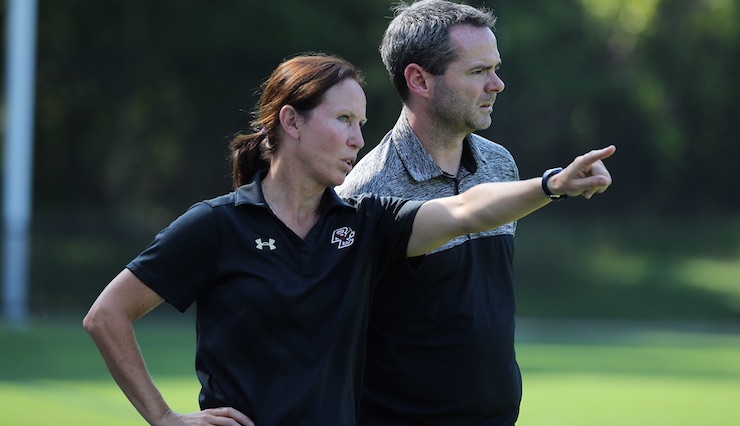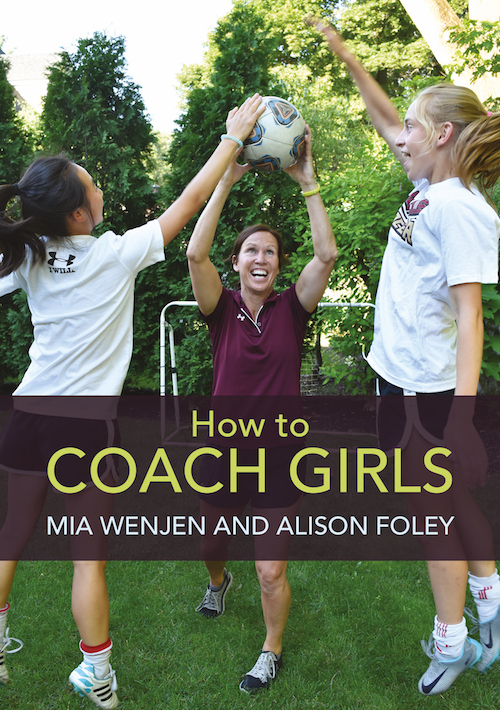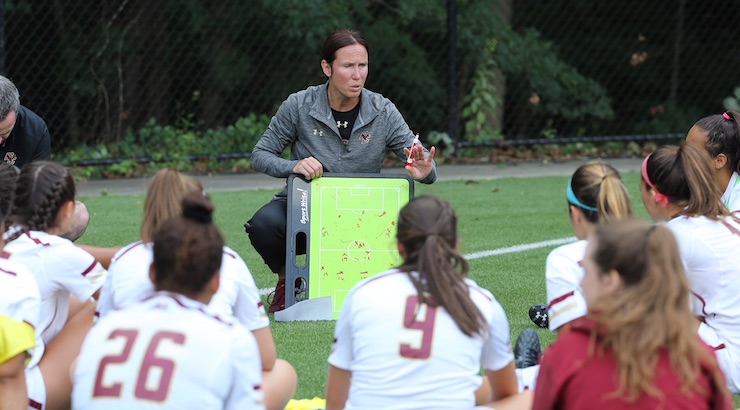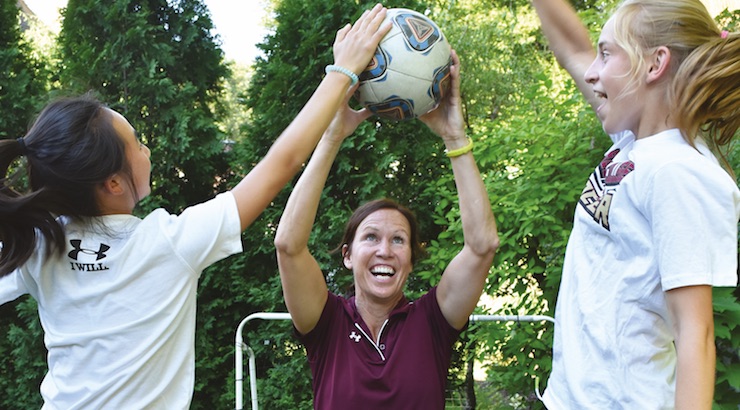Alison Foley on How to Coach Girls
Great insights and advice on Talking to your daughter after the match, being a positive force on the game’s sideline
DID YOU KNOW THAT 70% OF ALL KIDS QUIT ORGANIZED SPORTS BY THE AGE OF 13, WITH GIRLS QUITTING AT 6X THE RATE OF BOYS?
Mia Wenjen and Alison Foley wrote How to Coach Girls, a revolutionary book on coaching female youth soccer players. Alison Foley is the Boston College Women’s Soccer Head Coach. Her team’s success has led them to the NCAA Final Four and Final Eight during 13 consecutive playoff appearances. In her 20+ year career, she has coached many national team level players. She also coaches youth soccer and has a 15-year-old soccer playing daughter.

Here is GoalNaiton’s Diane Scavuzzo interview with Alison Foley:
This is Part II of the interview started in SOCCER LOVERS BOOK REVIEW: How to Coach Girls by Mia Wenjen and Alison Foley
Diane Scavuzzo: Youth soccer in the USA can be very competitive. Often coaches fear losing players if their youth soccer team loses too many games.
Do you believe that you have to win on the weekend in order to retain players?
Alison Foley: No, not necessarily. I think coaches need to set realistic game-by-game goals. If a team is only being evaluated and the only criteria for their success is by their win and loss record on the weekend, you will see that directly correlated when a team starts to lose players.
We like to make improvement goals. For example, maybe our last game we weren’t keeping possession very well. Maybe our last game we didn’t have a lot of shots on frame and they were going wide. So we’ll talk about, “This week at practice, we really want to work on possession. We really want to work on keeping the ball. And we really want to work on keeping our shots on frame.”
Regardless of the next game’s final score, if we can see success in the smaller goals, then kids will feel really validated and good about themselves — and feel they’re improving, even if the result doesn’t fall their way.
Diane Scavuzzo: If a parent wants to help their daughter be the best that she can be, what can they learn from reading your new book, How to Coach Girls?

Alison Foley: It is important for parents to know that there is one coach, they shouldn’t be giving any type of tactical information from the sideline.
There’s one coach and when you joined the team, you decided this is the coach that’s going to coach your daughter.
You’re going to let the coach do their job.
You can speak positively, you can encourage. And, I think it’s good to encourage the whole team, not just your daughter, so your daughter doesn’t feel all this pressure that you’re just watching her. So, words of encouragement to the whole team are great.
Making sure post-game, that you don’t focus on the result of “Great win” or “Can’t believe you guys lost.”
Leave the results alone and say, “It was really fun to watch you play. You and your teammates really were fun to watch you play today. Wow, you guys work really hard. Wow, you guys work as a unit. Your teamwork was so obviously out there.”
And, if you keep it to those things, win or lose, your daughter will have a good time and enjoy it and feel like you support her.
There are too many parents, more than the coaches, that are disappointed about a loss or trying to assess and break down the game and that’s another big, big reason why we’re losing kids at this terrible statistical speed.
We have a helpful Parent Code of Conduct in the book as well as a Player Code of Conduct.
Diane Scavuzzo: What are you like on the sideline of your daughter’s soccer match?
Alison Foley: People are like, “You’re so quiet on the sidelines. I can’t believe it.”
I’m thinking, “I’m paying the guy across the line a lot of money to coach my daughter. It’s not my job. That’s his job.”
I’ll say “Good job” and I’ll be positive. If I see something I don’t agree with, it is still not my place to say anything.
If my daughter asks me, “How did you think I did at the end of the game?” I will be very cautious to keep it constructive and positive. Not always, “You were phenomenal”, but I will say a couple little things that are constructive and positive and that’s it. There will never be more than a couple things.
 Diane Scavuzzo: In your book, there is the sentence, “The female player can’t be in the unknown.” I thought that was very powerful. Can you elaborate a little bit more?
Diane Scavuzzo: In your book, there is the sentence, “The female player can’t be in the unknown.” I thought that was very powerful. Can you elaborate a little bit more?
Alison Foley: This applies to all female players — It’s good for my college players as well as young girls.
It’s very hard, in my experience, for girls to do better at any level without the proper feedback and I’m talking national team or a U8 or U10 youth soccer player.
Girls are, for the most part, people pleasers. If they don’t know what your evaluation is, they’ll always think the worst of it.
If they’re not getting feedback, they’ll internalize that as, “She doesn’t think I’m doing well,” or “He doesn’t think I’m doing well.”
At Boston College, we do a lot of individual meetings as well and we do one-on-one meetings with the youth teams I work with. We always try to give a lot of feedback — just so the players know that, “Hey, I see you, I believe in you. Here are a couple things you’ve got to do, and I can see your improvement.”
If female players don’t hear feedback, they will struggle and think the worst.
And, then they perform worse. Even if you tell them, “Listen, I don’t think you’re a starter yet, and I know that you really want to start but here are a couple things we need to see you do a little bit better …” Then the player is great. They can handle a scenario that they don’t want, like not starting.
If they hear from the coach, “Here are the things that you need to improve on specifically, and I’m willing to work with you,” that’s music to their ears and they’ll operate in such a better space than a coach saying, “She’s not a starter so I don’t really have to give her that much feedback right now, she just has to do better.”

Diane Scavuzzo: So what do you think is the difference between coaching boys and girls?
Alison Foley: In my experience, and I’ve actually coached a youth 15 boys team, I think the biggest difference is girls want to know that everybody’s okay on their team and they’ll play better if everyone’s feeling a part of it.
I think the actual training session — you could write out the exact same training session from its warm up to its functional stage and its team scrimmage but I think the delivery and the organization of the training plan has to be different.
I think the feedback and the delivery are important when coaching girls. Girls may struggle if it’s too derogatory or too personal, whereas sometimes this can motivate a boy. Boys are also okay in the limelight and girls prefer to have the team take credit, instead of being singled out for praise. There are exceptions for sure, but I would say this goes to the majority of a girl versus a boys team.
Diane: What advice do can you share for competitive coaches?
Alison Foley: I think you have to offer the best player and your twenty-third, your last player on the team, the same amount of you.
For instance, we watch the same amount of video individually with all of our players. Now, they might only have two minutes in that game as opposed to somebody who had 88 minutes, but we still give them their half hour, in a once a week meeting.
We’re going to work with our lead scorer in front of goal a lot and I believe you also have to work with somebody who barely plays and give her an individual training session as well — and, understand that this will get her better. She might not be as talented right now, but if you give individual attention equally across the board to all your players, they’ll feel valued and their self-esteem is going to stay high.
It’s really hard to improve your game with low self-esteem.
I think whether that’s a recreational coach or a professional coach or college coach, this approach remains very consistent when coaching girls.
It is also important to keep the girls involved who don’t get tons of playing time. Perhaps you can give them other responsibilities. For example, they could be the leader in community service, they could be the person that leads the warm-up — it shows that you’ve given them responsibility. It shows that you believe in them.






